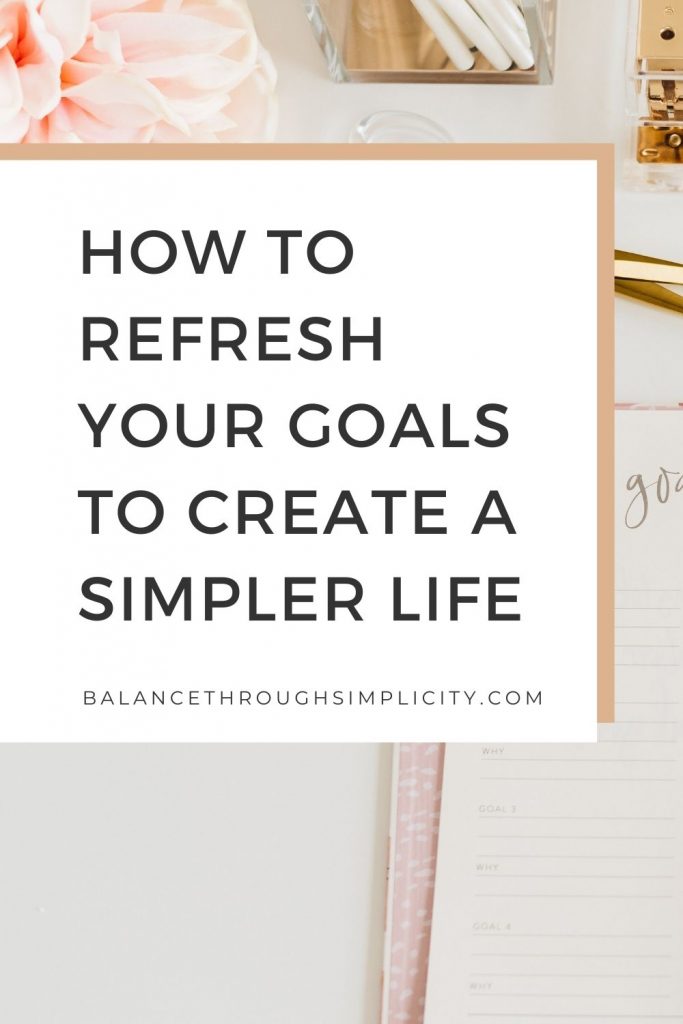HOW TO REFRESH YOUR GOALS AND WHY IT MATTERS FOR A SIMPLER LIFE
Nothing clutters your mind like thoughts, dreams, plans and goals that don’t align with what matters to you. Chasing things that aren’t worth chasing or holding on to ideas, dreams and decisions that no longer resonate with us or our life. In this article we explore how to refresh your goals and why it matters for a simpler, clutter-free life.
SETTING GOALS
Setting goals at the start of each year is something that many of us do to close one year and embark on the next. They’re helpful for personal growth to motivate and inspire us to try new things and make the most of all that life has to offer – a life that’s full, rich and rewarding in whatever way that means to you.
Reflect on the quote from Mark Twain, “Without dreams and goals, there is no living, only merely existing, and that is not why we are here.”
Unfortunately, goals, like so many of those New Year resolutions we also make, tend to fall by the wayside when life gets in the way.
That’s why I think it’s helpful to revisit and refresh your goals often.
Ask yourself:
- Do your goals still have meaning?
- Do you still want to achieve them?
- Are they still important?
- Are they stretching you enough or too much?
- Have other things in life become more important?
In this article I’d like to offer you some ideas and tips on how to refresh your goals, decide whether they’re still relevant to you right now and why it matters when you’re trying to create a simpler, more intentional life.
HOW TO REFRESH YOUR GOALS
1. Re-visit your previous goals for this year
If you set goals for yourself earlier this year, take a look at them now. Be objective and look with fresh eyes. How many have you achieved? Are you part-way to reaching some of them or have they gone no further than just scribbles on paper?
- Is there a reason you’ve been successful with all, some or none? Do you notice a pattern?
- If you haven’t been successful, is it because they weren’t realistic or were they reliant on other people or factors beyond your control?
- Did you have an action plan to put them in place or did you just say you wanted to achieve X, Y or Z – a big target without breaking it down into manageable, bite-sized, accountable steps?
If you set goals but didn’t reach them, it’s always a good idea to work out why and asking yourself these questions might help you understand why.
2. Define your priorities to check your goals are still relevant
One of the other reasons that we don’t keep up with our goals is because they don’t matter enough to us.
For example, it’s all very well saying you want to get fit, but why? Is it to run a marathon and raise money for a charity whose work you support, or is it to be able to have fun and play football with your children?
Do you want to set up a business working for yourself? It’s hard work doing that and although there can be flexibility, it can come with other hassles. Ask yourself why do you want your own business? To fit around school times, be there to collect your kids at home time and available to help with their homework?
To be focused and motivated to achieve your goals, they have to be important to you and evoke an emotion. We base many of our decisions (and actions) on our emotions so if you want to do something, it’s often helpful to feel a reason for doing it.
And that’s where setting goals just once a year can cause problems. Life can change at the drop of a hat and what you wanted in January isn’t the same as what you want in September or October. We change, our responsibilities and priorities change. Your goals need to change sometimes too.
Ask yourself whether the goals you have set yourself STILL matter. If they’re no longer relevant to you right now, change them. You can go back to them at a later date. Choose goals that matter and are a priority to you right now.
You might find it helpful to make a list of all the different aspects of your life including home, health, financial, work, family, friends, leisure, hobbies, relationships, social, emotional, spiritual. What do you want to develop or what needs work? Which are most important to you right now? What takes up most time in your thoughts or in your day?

3. Identify your next 3 goals and be specific
Having thought about your current priorities, the next step is to choose just 3 goals that focus on those priorities you chose above. You can choose less but I wouldn’t suggest over-reaching and choosing more. You need to feel that your goals are achievable otherwise you might feel disheartened if you don’t achieve them and that’s not very motivating!
Choose 3 goals and write them down. Be specific. Be positive. Give yourself an outcome that’s measurable and a completion date that’s realistic. Read more tips on how to write goals.
4. Make an action plan to achieve those 3 goals
For your goals to take shape you need to break them down. Small goals, but particularly big goals, are best achieved when you have a plan to make them happen. Include things like what you’ll need to make them happen
For example, to run a marathon you might need some clothing and suitable trainers. You’ll also need to make time in your schedule, a fitness program to keep you on track, maybe a friend or coach to keep you accountable. Perhaps you can think of other things.
Whatever your goal requires, set it down in writing next to your goal with an action plan of how to make it happen. Your action plan will look different depending on the goal you’ve set but these action steps need to be simple and precise.
Your next step is to put those action steps in your To Do list and schedule and take action and do them. Tick each action step off and you should be on your way to achieving your goals!
5. Choose a word for this month or season
Sometimes it can feel a bit rigid and structured to follow a set of action points leading to your goal. Some people respond well to this structure and love ticking things off, others feel suffocated and prefer something a little more creative or visual to inspire them!
You could try basing your goals on a word of your choice. We choose a word for the start of the year to sum up how we’d like that year to go, or how we’d like to approach it. But, what about a word for this week or month or season? Shorter time frames seem easier to focus on.
Try choosing your word for this month (E.g. relax, rest, gratitude, joy, acceptance, release, simplify and there are so many more you could choose too) and see if that helps you set some goals around that word.
6. Create a vision board
Another suggestion for the visual learners amongst you, is to create a vision board for your goals. Instead of writing them down, pull together some images or words that describe your goals and make them into a collage on paper or perhaps your computer desktop. You can still include the words to describe your goals but you can also get creative with pictures and illustrations to evoke emotion, motivation and inspiration.
7. Write a kind and motivating letter to yourself
If you don’t like the idea of bullet-pointed action steps or lists and art isn’t your strong point, what about writing a letter to yourself instead? Explain what you’d like to achieve and why. Be kind to yourself and loving and read that letter back to yourself often.
Sometimes the very act of committing pen to paper and thinking on the words that we want to lay down is the best way of crystalising our thoughts and committing them to memory. Half the battle with our goals is that we forget to look at them!
Write a letter to yourself that’s encouraging and empowering and like a letter that your best friend would write to you.

GOAL-SETTING TIPS
We’ve looked at some of the ways you can refresh your goals and why it matters but I wanted to give you a few tips that I’ve found helpful in setting my own goals.
1. Choose small things not just big things
Goals don’t have to be big. They can be small things too as long as they are important to you. Clearing out your fridge and freezer could be a goal for this month as it will make preparing meals and planning your shopping list so much easier.
2. Start with a quick win
Put one of your smaller goals at the top of your list or start with a very small action point for one of your bigger goals. A quick win and something that you can easily tick off as done will boost your confidence and motivate you to continue.
3. Do something regularly towards your goal
Try to make it a regular part of your daily routine to do something towards your goals. The more you do something, the more it becomes a habit and the less likely you are to wander off course.
4. Listen to yourself and be objective with what you hear
If you’re trying to prepare for that marathon but find yourself procrastinating or making excuses, be honest. If you’re consistently not putting in the training then is it because you don’t really want to run that marathon badly enough, or is it because you’re too busy watching TV, or are you too tired and you need to slow down to give yourself space and energy for training? Sometimes we all have to push ourselves to do something, but if you find you’re pushing yourself regularly then you need to ask yourself why?
An intentional life is a life of purpose and meaning. If you feel yourself floundering and not sure what direction you’re heading in, why not check out my Annual Goal-Setting Workbook? Build goals that matter to you, make your ideas and dreams happen and stay focused to achieve whatever you set your mind to! Click here to learn more…
WHY SETTING GOALS HELPS SIMPLIFY LIFE
I hope you enjoyed these suggestions on how to refresh your goals. If you want to set goals, it’s very much trial and error to find a way to set them that works best for you.
I like setting goals for myself but I’m also aware that sticking to them isn’t always easy. I don’t get cross with myself if I don’t achieve them and I don’t use them as a benchmark for how successful I think I am in any area of my life.
What I do like about goals is that they give structure to my life and where it’s headed. They remind me to prioritise the important things in life, push me out of my comfort zone every now and then and make the most of opportunities. And, the benefit isn’t just in reaching the goal. It’s about what you learn along the way.
Further reading: Minimalist goals to simplify your life this year
“What you get by achieving your goals is not as important as what you become by achieving your goals.”
Henry David Thoreau
Take a moment to think about any goals that you could set for the next month or so. If you’re not sure what goals to set, or feel your life is too busy or cluttered and you don’t have time, I encourage you to take a look at Simplify Your Life.
Simplify Your Life is a guide and workbook to help you decide what you want more of (and less of) in life and take some baby-steps to help you get started. Learn more here…

